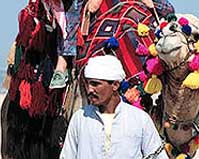 Festivals
hold an unusual lure for the Rajasthanis,
and they find any number of reasons to celebrate.
While some of these are traditional festivals,
there are also a large number that have
been recently introduced by the tourism
department. However, some of the larger
and important celebrations are listed below
Festivals
hold an unusual lure for the Rajasthanis,
and they find any number of reasons to celebrate.
While some of these are traditional festivals,
there are also a large number that have
been recently introduced by the tourism
department. However, some of the larger
and important celebrations are listed below
Baneshwar Fair
This is a tribal fair on the banks of the
Mahi and Som rivers in the forested area
around the border of Rajasthan that it shares
with Madhya Pradesh and Gujarat. Bhil tribals
from all three states gather here to worship
Shiva.
This celebration is a recent introduction in the desert city Bikaner with the only camel breeding farm in the country. Most of the events are staged around this beast, with camel races and camel dances
Desert Fair
Jaisalmer exercises immense charm, but with
the staging of the annual Desert Festival
(January - February), it has also become
one of the important events on the annual
calendar. This is a showcase of the performing
arts of the region on the stretching sands
around this desert citadel. A number of
events include turban tying competitions
and camel races.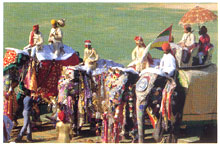
Elephant Festival
This festival on the occasion of Holi in
Jaipur, is the festival of pachyderms includes
several interesting attractions including
elephant polo. The caparisoned elephants,
their bodies painted with floral decorations
by the mahouts, are a sight to behold.
Gangaur Fair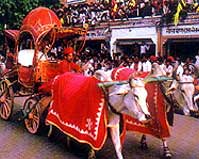
Celebrated all over Rajasthan, it has women
taking out processions through the streets
of towns, carrying images of the divine
couple. Idols of Issar and Gangaur, manifestations
of Shiva and Parvati, are worshipped by
women, and particularly those unmarried
who pray for a consort of the like of Shiva.
Marwar Festival
This annual event attempts to showcase the
art and culture of the Jodhpur region in
month of October. It is devoted almost exclusively
to song and dance, and the Maand Festival
has become a part of this huge regional
celebration.
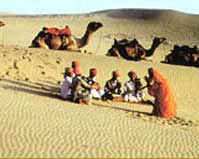 Nagaur
Fair
Nagaur
Fair
A trading fair for cattle and camels in
January - February, it is a wonderful opportunity
to catch up on rural life as owners from
all over the state come to camp on the outskirts
of Nagaur while they buy and sell animals.
The hides of the animals, cut into beautiful
patterns, are particularly interesting.
Fairs & Festivals
The people of Rajasthan live life to the hilt and nobody can really match the gay abandon with which the Rajasthani surrenders himself to the numerous fairs and festivals that are celebrated here.
There are animal fairs, to mark the chanting seasons. In fact, celebrations occur almost round the year and provide the visitor with a splendid opportunity to gain an insight in to the life of the Rajasthani. There is dancing, singing, drama, devotional music and other community activities that can enthrall the visitor.
Some of the more important fairs and festivals are the Desert Festival of Jaisalmer (held in January- February), Pushkar Fair, held in Pushkar, near Ajmer (November), Gangaur Festival, Jaipur (Murch- April ), Elephant Festival, Jaipur (March- April ), Marwar Festival, Jodpur (October), Camel Festival, Bikaner (January), Mewar Festival, Udaipur.
Listed here is a very small selection of the countless number of exciting events that are held in Rajasthan throughout the year.
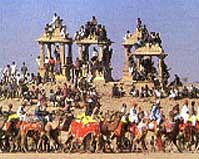 BANESHWAR
FAIR: Held at Baneshwar at the
time of Shivratri (January – February),
this is a tribal fair on the banks of the
Mahi and Son rivers. Bhil tribals from all
three states gather here to worship Shiva,
and set up camps in this forested area in
colorful groups.
BANESHWAR
FAIR: Held at Baneshwar at the
time of Shivratri (January – February),
this is a tribal fair on the banks of the
Mahi and Son rivers. Bhil tribals from all
three states gather here to worship Shiva,
and set up camps in this forested area in
colorful groups.
CAMEL FESTIVAL: Held in Bikaner
in January, this celebration has been recently
introduction in the desert city with the
only camel-breeding farm of the country.
Not unexpectedly, most of the events are
staged around this beast, with camel races
and camel dances. There are also several
folk performances. This may also be your
chance to experience the rare fire dance
staged late at night.
CHAKSU FAIR: A gathering
of people from Jaipur's rural pockets collects
here in almost all forms of transport –
laden into tractor trolleys and jeeps –
at what must be one of the most colorful
events on the Rajasthani fair calendar.
DESERT FAIR: Jaisalmer
exercises immense charm, but with the staging
of the annual Desert Festival (January –
February), it has also become one of the
stretching sands around this desert citadel.
A number of amusing events at the stadium
include turban tying competitions and camel
races.
ELEPHANT FAIR: On the occasion
of Holi in Jaipur, this festival of pachyderms
includes several interesting attractions
including elephant polo. The caparisoned
elephants, their bodies painted with floral
decorations by the mahouts, are a sight
to behold.
GANGAUR
FAIR: Idols of Issar and Gangaur,
manifestations of the Hindu God Shiva and
Goddess Parvati, are worshipped by women,
particularly the unmarried who pray for
a consort like Shiva. Celebrated all over
Rajasthan, it has women taking processions
through the streets of town, carrying images
of the divine couple.
KOLAYAT FAIR: The sacred
site where Kapil Muni is supposed to have
meditated, a fair is held here on banks
of its lake, the air bristling with excitement.
Kolayat can be visited from Bikaner.
MARWAR FESTIVAL: Held every
October in Jodhpur, this annual event attempts
to showcase the art and culture of the Jodhpur
region. It is devoted almost exclusively
to song and dance. The Maand Festival has
become a part of this huge regional celebration.
MEWAR FESTIVAL: Held to
coincide with Gangaur in Udaipur, the whole
city turns out to mark the culmination of
the 18-days festival, with a procession
of floats on Pichola lake.
NAGAUR FESTIVAL: A trading
fair for cattle and camels in January –
February, it is a wonderful opportunity
to catch up on rural life as owners from
all over the state come to camp on the outskirts
of Nagaur while they buy and sell animals.
The hides of the animals, cut into beautiful
patterns, are particularly interesting.
NAVARATRI: The nine days
preceding Dussehra are marked by fasting,
and one ritual meal a day. The martial Rajputs
sacrifice a goat as food for consecration.
The worship of their weapons is obligatory,
usually in the month of September –
October. It is a private celebration with
no public fanfare.
PUSHKAR FAIR: Among the most easily identifiable of Rajasthan's many fairs, Pushkar has come to symbolize the heartbeat of the people of the state. Held in November in Pushkar, the temple town close to Ajmer, where an 8th century temple of Brahma draws the faithful, it is located on the banks of lake. Pilgrims bathe here and pray in the temple, while the actual fair is held in the vast stretching desert around it. Here, traders set camp to strike deals at India's, and probably the world's largest camel fair, though horses are also sold. It is also a time for friends and families to get together, camp in the desert, entertain each other with folk songs and dances, cook meals over camp fires, and wander through the exuberant melee of people looking for handicrafts, or merely to stand in a queue for the giant wheel… Special tented camps are set up on the occasion for visitors but such is a draw of this fair internationally, that even these are soon exhausted, and people may have to stay in nearby Ajmer, or even as far as Jaipur, visiting here by day
SITLA MATA FAIR: A large
fair is held to propitiate the goddess of
war whose wrath can be the terrible scourge
of smallpox unless appeased by her followers.
sacred food on this day consists of stale
food left out the previous night. The fair
is held in and around the temple dedicated
to goddess in Amber, Jaipur.
SUMMER FESTIVAL: Held in June in
Mount Abu, this is one of few celebrations
during the summer months (though it coincides
too with the marriage 'season'
which spans, according to planetary chartings,
from May-July). In the cool environs of
the hill town, it is time to relax while
folk performances are staged, particularly
of the Bhil tribes of the region.
TEEJ: Another festival
dedicated to the worship of Shiva and Parvati,
this time it is married women who pray for
a long, happy marital life during the monsoon
months of July-August. Though celebrations
are held all over the state, they are particularly
colorful in Jaipur where a procession wends
its way through the heart of the old city.
Women dress in their finery and spend time
in groups at swings that are specially erected
for the festival.
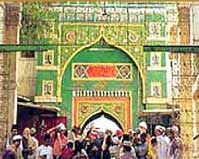
URS AJMER SHARIF: Held
in the holy town of Ajmer in honour of the
Sufi saint, Khwaja Moinuddin Chisti, special
prayers are offered at the mosque, and huge
amounts of consecrated food offered from
the large, steaming cauldrons that were
a gift from Akbar. While quwwalis -folk
songs are sung at night, the celebration
unite people of all faiths, and the complete
town is decorated with buntings, and wears
the spirit of festivity.